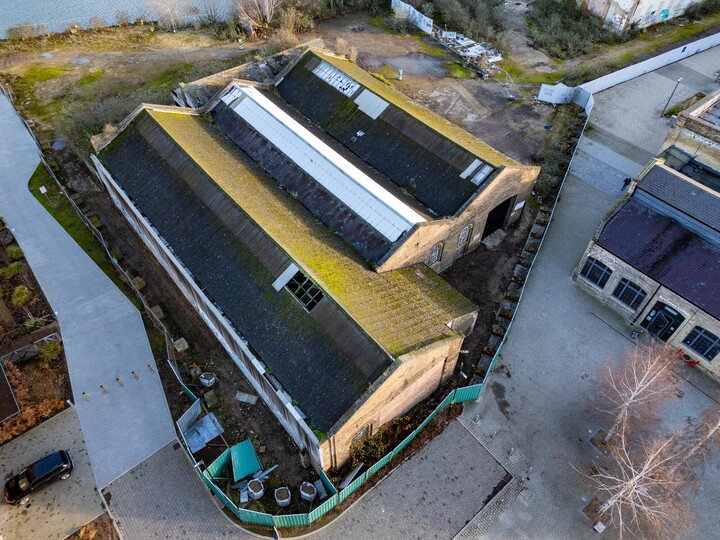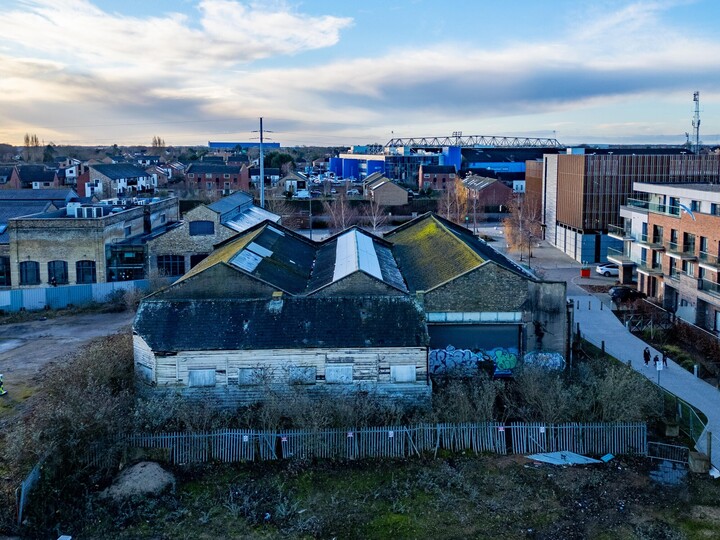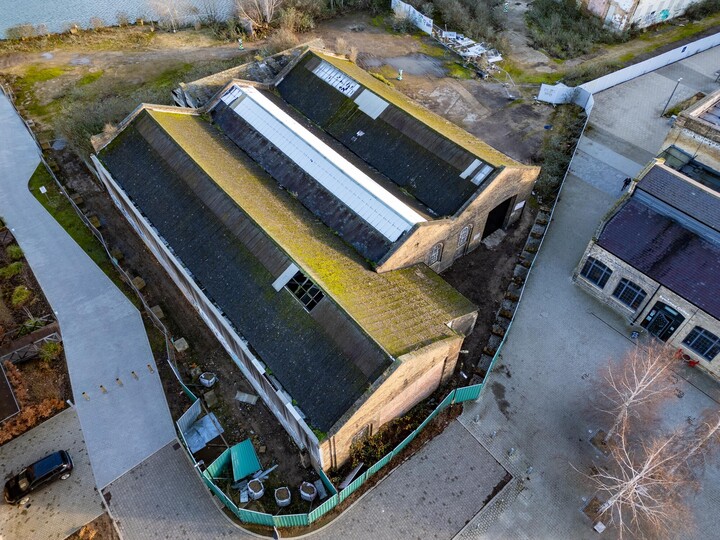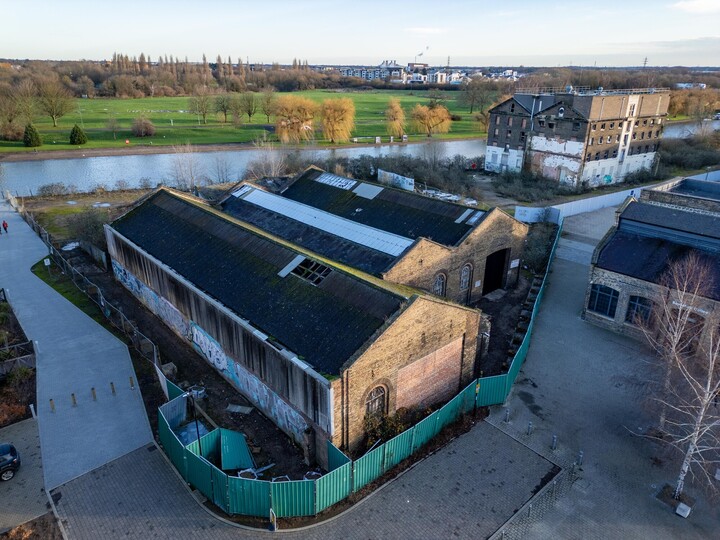Peterborough City Council has deferred a key decision on the future of the historic Goods Shed at Fletton Quays. New leadership says they need “firmed up assurances” over funding, legal arrangements, and project risks before approving the £1.9 million grant and sale to a private developer. CAMBSNEWS special report.
Peterborough City Council’s new leadership has delayed a major decision on the future of the historic Goods Shed at Fletton Quays, after calling for greater clarity over key aspects of a multimillion-pound redevelopment deal.
The proposal — set out in a detailed report to Cabinet titled “Disposal of Goods Shed, Fletton Quays – Final Terms” — was due to be debated and decided on at the council’s October 2 meeting. However, council leader Cllr Shabina Qayyum announced that the item had been deferred, not withdrawn, to allow more time for scrutiny.
“At the request of myself and councillor Mohammad Farooq who are looking into the finer detail around this item, it is being deferred — deferred, not withdrawn,” said Cllr Qayyum. “It will not be considered at today’s meeting until we can get sort of more firmed up assurances around certain matters.”

Deputy Leader Cllr Farooq, who holds the Growth and Regeneration portfolio, thanked officers for their work, naming Chris Pike, Adrian Davey and Adrian Chapman among those who had “put a lot of hard work” into the project. But Cllr Qayyum interjected, reminding members that because the item was deferred, “we don’t need to go into the detail of it.”
The deferment means further delay to a decision on a flagship regeneration site seen as a cornerstone of the city’s Towns Fund programme, a government-supported investment package worth up to £22.9 million for Peterborough.
A Heritage Building at the Heart of Fletton Quays
According to the Cabinet report, the Goods Shed is a listed building requiring “significant investment”, located next to the proposed Cygnet footbridge, retail units, and council offices at Fletton Quays. The council bought the site from the Peterborough Investment Partnership in February 2024 for £250,000, “for the purpose of providing a food and beverage facility as part of the Towns Fund project.”
The report outlines a plan to sell the property to a developer, Farholt Goods Shed Limited, for the same price — £250,000 — and to provide a grant of £1.895 million to support the building’s transformation into a food hall and “ancillary uses.”
It states that “re-negotiated terms have been agreed with Farholt Goods Shed Limited (Farholt) to bring forward the food hall,” and that “Towns Fund grant funding is being provided towards development viability.”
Part of the Vine Project
The scheme forms part of The Vine, one of eight Towns Fund-supported projects in Peterborough. The Vine project was originally planned for Bridge Street, but the report notes that the site was “considered unviable in 2023” and that the project was subsequently split across three sites — Central Library, Peterscourt, and the Goods Shed.
The Goods Shed’s redevelopment is described as crucial to that restructured approach. “The property was acquired by Peterborough City Council… for the purpose of delivering the food hall element of the Vine project,” the report says, adding that the Goods Shed provides an “opportunity to redevelop the site by delivering the food & beverage Vine project objectives.”

The government’s Department for Levelling Up, Housing and Communities (DLUHC) has agreed to extend Towns Fund deadlines, with the “spend committed-by date to 31 March 2027 and spent-by date to 31 March 2028.”
From Lease to Freehold Sale
The report reveals that the council initially sought an operator via a public tender. “A procurement exercise… was issued in early 2024,” it says, but only “two purported to have food & beverage experience.” The tender was “aborted due to the lack of interest” and the council “entered into negotiation with one of those interested parties who since incorporated a new limited company, Farholt Goods Shed Limited.”
Crucially, while a long lease had first been considered, the chosen developer proposed a freehold transfer, a move that reduces the council’s long-term control of the site.
Under the renegotiated terms, the report says: “PCC has agreed to sell the freehold title of the property… to Farholt for £250,000 on a subject to planning and subject to Farholt commencing works basis.”
The agreement requires that “both conditions are satisfied” — planning approval and work starting on site — before the sale completes. The council will “retain control up to the point of Farholt commencing works.”
Legal advisors Trowers & Hamlins have drafted the sale contract and grant agreement, which will be “entered into simultaneously.”
The £1.895m Grant
The Cabinet paper sets out detailed conditions for the £1.895 million grant. “PCC is providing grant funding… for the purpose of the development of the Goods Shed which forms part of the delivery of the Towns Fund Vine project,” it says.
The grant will be paid in stages and mainly “in arrears,” meaning funds are released only after work is completed and verified. The council has “the ability in certain scenarios to withdraw, reduce and seek repayment of grant in instances of insolvency, administration, liquidation, or the longstop dates are not met.”

However, the report also notes key limitations. “As this is not a procured scheme, Farholt is not contractually obliged to carry out the development,” it warns, adding that “there are no enforceable obligations requiring Farholt to complete or commence development.”
If Farholt sells the site, a “clawback sum” — capped at the grant total — could be triggered, but officers acknowledge that the “limited value” of this clause makes it largely symbolic, given “the level of grant, construction cost, and potential value of the property.”
Risks and Assurances
The report acknowledges that while officers have “sought to protect the grant funding,” some risks remain outside the council’s control.
Among the measures listed are “an arrears draw down process with evidence of prior spend,” limits on pre-completion spending, and “first refusal to buy back at market value if at any time prior to completion of the works Farholt proposes to sell.”
But officers caution councillors that “Farholt are unlikely to satisfy” requirements to show full project funding before the grant is drawn down. “Members need to take account of this in their decision-making,” the report states.
It adds that “the importance of this site to the Vine, Fletton Quays, and the proximity to PCC’s Sand Martin House office and proposed Cygnet Bridge means that the project would benefit from greater PCC control.” Disposing of the freehold, it warns, “means PCC would lose an element of control over both the project timings, and future ownership.”
Financial Picture
Financially, the Goods Shed project sits within the council’s Towns Fund capital programme, with no extra local funding available if the scheme falls through. “If the transaction doesn’t complete, PCC do not hold funds to bring forward the food hall,” the report confirms.
It also acknowledges “insufficient assurance that the revenues generated from the operation are sufficient to fund the level of developer investment required,” noting a “viability gap beyond the grant being made available.”
Farholt is expected to “amend their financial model throughout the design stage,” looking to “reduce capital, increase turnover and increase efficiencies.”
The grant must be committed by March 2027 and fully spent by March 2028 to comply with government deadlines.
Benefits and Aims
Despite the risks, officers present a strong case for the project’s regeneration and community benefits. The development, they say, will “bring a heritage building back into active use after years of under-utilisation,” “create a new attraction that drives footfall and local spending,” and “strengthen community pride by repurposing an iconic building.”
It is expected to “provide affordable space for new and small food and beverage businesses, helping entrepreneurs enter the market,” and to “act as a catalyst for further investment and development.”
The report also frames the disposal as consistent with the council’s legal obligations under Section 123 of the Local Government Act 1972, noting that valuations “evidence PCC’s compliance with its duty to obtain best value.”
Furthermore, it argues the development will “promote or improve the economic and social well-being of the area,” satisfying the criteria of the General Disposal Consent 2003 for land sold at an undervalue.
Options and Next Steps
The report confirms that several alternatives were assessed and ruled out. These included keeping the project at its original Bridge Street site, which was “disregarded due to viability challenges,” and using the Central Library, which was “disregarded due to space restrictions.” Doing nothing was also deemed untenable, as it “does not support the council’s ambitions” and would leave the Goods Shed “with no use.”
The deferral announced by Cllr Qayyum now means Cabinet members will revisit the issue once additional assurances are provided.



















